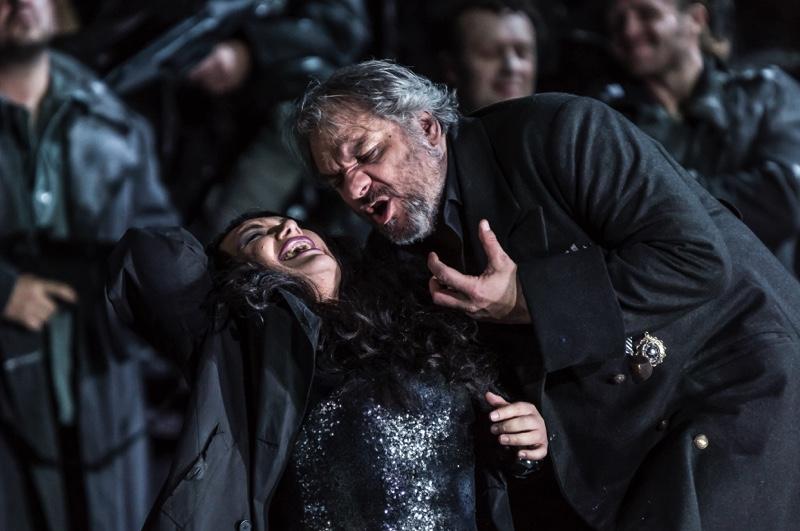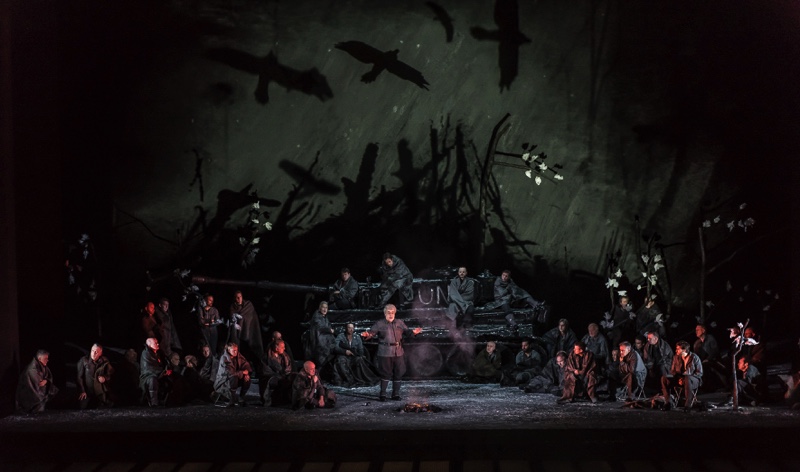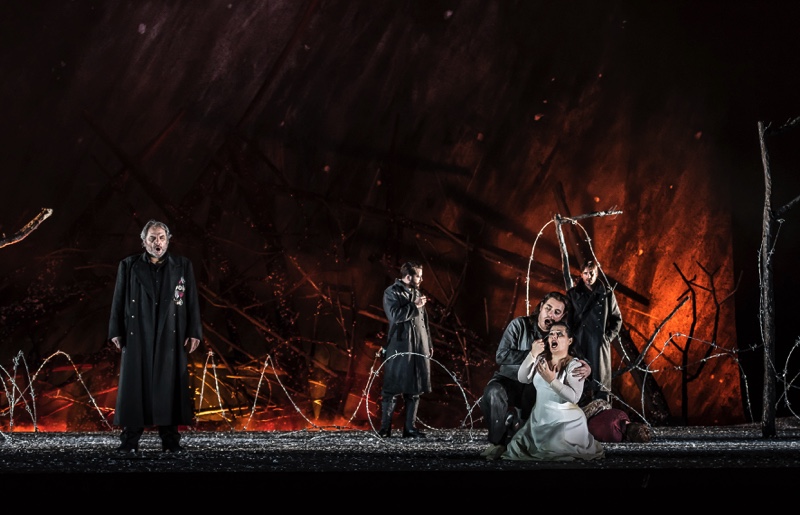Il Trovatore, Royal Opera | reviews, news & interviews
Il Trovatore, Royal Opera
Il Trovatore, Royal Opera
Dark world created around strong, stand-and-deliver Verdi singing

That often-repeated truism about Verdi's craziest melodrama, that it needs four of the world's greatest voices, makes no mention of acting ability. Given the top-notch international approach to this kind of opera, impressively fielded by what's called "Cast A" here, German director David Bösch was right to build a dark, consistent visual world around mostly stand-and-deliver performances rather than demand too much of his stars.
Noseda's is the most impressive approach to Verdi style since Mark Wigglesworth's firing-up of an even more difficult case in the canon, The Force of Destiny, at ENO. Yet where Wigglesworth was dark and deep, Noseda prefers light and springy. There are points in the hell-for-leather conclusions to duets and trios where you might want a little more hell-fire, but the swiftness certainly drives home the incredible daring of Verdi's often elliptical approach to operatic formulas, making a virtue even out of the endlessly repeated ballad-style repetitions of the plot's pre-history: in short, that a gypsy was driven so mad by her mother's burning as a witch that she threw her own baby onto a bonfire by mistake. The set-up is urgently delivered at the start by Maurizio Muraro's captain Ferrando in front of a tank and a questioning male chorus sounding more expressively as one than I've ever heard them (pictured below). Bösch and his set/video designer Patrick Bannwart give us a black, white and silver setting in time of near-contemporary warfare, turning orange-red when the flames arise. Crude graffiti gives way to naive illustrations of the back-story with figures dangerously – deliberately? – close to the big-eyed kids of Margaret Keane. Principal soprano Leonora's love for troubadour Manrico, out of joint with the nasty times, emanates butterflies and hearts. The Spanish gypsy crew could be out of Almodóvar or Bieito – shades of his widely-seen Carmen – but Bösch is more disciplined as they bring circus colour to the darkness; Azucena, understandably driven halfway to madness by her past atrocity, inhabits a caravan with baby dolls pinned to the doors.
Bösch and his set/video designer Patrick Bannwart give us a black, white and silver setting in time of near-contemporary warfare, turning orange-red when the flames arise. Crude graffiti gives way to naive illustrations of the back-story with figures dangerously – deliberately? – close to the big-eyed kids of Margaret Keane. Principal soprano Leonora's love for troubadour Manrico, out of joint with the nasty times, emanates butterflies and hearts. The Spanish gypsy crew could be out of Almodóvar or Bieito – shades of his widely-seen Carmen – but Bösch is more disciplined as they bring circus colour to the darkness; Azucena, understandably driven halfway to madness by her past atrocity, inhabits a caravan with baby dolls pinned to the doors.
We swallow all this because the musical expression is so persuasive, down to Jette Parke Young Artists Jennifer Davis and David Junghoon Kim making their presences felt in the smallest of roles. Lianna Haroutounian has been a real asset to the Royal Opera since she stepped in after Anja Hartetos completed one performance as Elisabetta in Don Carlo. Haroutounian is that rarity, a soprano who can manage both the coloratura and the warm urgency of Leonora's huge, arching phrases. She sometimes sings sharp – chiefly in the Miserere as the heroine responds desperately to her death-sentenced lover's voice somewhere beyond the barbed wire – but that's a fault of generosity where flat notes would be a sign of under-energised delivery. Francesco Meli as the testosterone-driven tenor hero (pictured above with Željko Lučić, left, and Haroutounian) delivers all the goods, only the now-obligatory top C at the end of "Di quella pira" a bit short of Pavarotti lustre. But he can sing softly and ardently – the preceding Romanza is superb – as well as loudly. Which is about the measure of Željko Lučić as the dark side of the love-triangle, bloodthirsty Count di Luna – a coarse but effective version of the standard but hard-to-find Verdi baritone.
Francesco Meli as the testosterone-driven tenor hero (pictured above with Željko Lučić, left, and Haroutounian) delivers all the goods, only the now-obligatory top C at the end of "Di quella pira" a bit short of Pavarotti lustre. But he can sing softly and ardently – the preceding Romanza is superb – as well as loudly. Which is about the measure of Željko Lučić as the dark side of the love-triangle, bloodthirsty Count di Luna – a coarse but effective version of the standard but hard-to-find Verdi baritone.
The even harder-to-find Verdi mezzo is best of all. Ekaterina Semenchuk as Azucena is the one of the principal quartet who could probably manage more nuanced acting than is asked of her. She has it all: the flaming top notes, the cutting chest voice, the most intensive pianissimos which make her death's-door lullaby "Ai nostri monti" so affecting (Meli rises, or diminishes, to the occasion, too). There's no doubt about it: Semenchuk is not only the Azucena but also the Eboli and Amneris for our age, a more urgent actress than her Russian senior Olga Borodina who's owned these roles for so long.
In those surprisingly harrowing closing stages Bösch and Bannwart are at their finest, keeping the violence on both sides to a minimum in the atrocities threatened on three token male prisoners-of-war and leaving the stage clear for the main characters, stripped of all illusions. Big Eyes melt into black horrors and a gigantic pyre rises effectively behind crushed hopes. The final gesture is a strong conclusion to a parallel universe which you may love or hate – violent mutterings of protest were all around me, though sadly not the bravos that should have greeted such fine singing – but which is in tune with this most bizarre and most easily-parodied of all Verdi's operas.
rating
Share this article
Subscribe to theartsdesk.com
Thank you for continuing to read our work on theartsdesk.com. For unlimited access to every article in its entirety, including our archive of more than 15,000 pieces, we're asking for £5 per month or £40 per year. We feel it's a very good deal, and hope you do too.
To take a subscription now simply click here.
And if you're looking for that extra gift for a friend or family member, why not treat them to a theartsdesk.com gift subscription?
more Opera
 Prom 52, Carmen, Glyndebourne Festival review - fine-tuning a masterpiece
No loss of vivid focus as the Albert Hall becomes Bar Lillas Pastia
Prom 52, Carmen, Glyndebourne Festival review - fine-tuning a masterpiece
No loss of vivid focus as the Albert Hall becomes Bar Lillas Pastia
 Verdi's Requiem / Capriccio, Edinburgh International Festival 2024 review - words, music, judgement
Philharmonia Orchestra closes the festival with grandeur and intimacy
Verdi's Requiem / Capriccio, Edinburgh International Festival 2024 review - words, music, judgement
Philharmonia Orchestra closes the festival with grandeur and intimacy
 The Fabulist, Charing Cross Theatre review - fine singing cannot rescue an incoherent production
Beautiful music, but curious decisions in scripting and staging sink the show
The Fabulist, Charing Cross Theatre review - fine singing cannot rescue an incoherent production
Beautiful music, but curious decisions in scripting and staging sink the show
 Le nozze di Figaro, Komische Oper Berlin, Edinburgh International Festival 2024 review - great singing wasted
Entertaining in places, this is Kirill Serebrennikov’s piece, not Mozart’s
Le nozze di Figaro, Komische Oper Berlin, Edinburgh International Festival 2024 review - great singing wasted
Entertaining in places, this is Kirill Serebrennikov’s piece, not Mozart’s
 Oedipus Rex, Scottish Opera, Edinburgh International Festival 2024 review - beautifully uncomplex
Organic immersion for this memorable night at the museum
Oedipus Rex, Scottish Opera, Edinburgh International Festival 2024 review - beautifully uncomplex
Organic immersion for this memorable night at the museum
 Prom 24, The Fairy Queen, Les Arts Florissants/Le Jardin des Voix, Agnew review - hip-hop hornpipes
A spectacularly skilful show lacks the human touch
Prom 24, The Fairy Queen, Les Arts Florissants/Le Jardin des Voix, Agnew review - hip-hop hornpipes
A spectacularly skilful show lacks the human touch
 Tristan und Isolde, Glyndebourne review - infinite love at white heat
The London Philharmonic Orchestra burns for the country house opera’s music director
Tristan und Isolde, Glyndebourne review - infinite love at white heat
The London Philharmonic Orchestra burns for the country house opera’s music director
 The Butterfly House, Clonter Opera review - Puccini in biographical briefs
The life and many loves of the composer told with his own music
The Butterfly House, Clonter Opera review - Puccini in biographical briefs
The life and many loves of the composer told with his own music
 ll Segreto di Susanna/Pagliacci, Opera Holland Park review - on with the motley, out with the fags
An intriguing comic partner for the great backstage melodrama
ll Segreto di Susanna/Pagliacci, Opera Holland Park review - on with the motley, out with the fags
An intriguing comic partner for the great backstage melodrama
 First Person: trans opera singer Lucia Lucas on Tippett’s 'New Year' and her life in music
The baritone’s success with Birmingham Opera Company has led to further reflections
First Person: trans opera singer Lucia Lucas on Tippett’s 'New Year' and her life in music
The baritone’s success with Birmingham Opera Company has led to further reflections
 theartsdesk at the Buxton International Festival - power and glory in early Verdi
An enjoyable surprise in ingenious Handel oratorio staging
theartsdesk at the Buxton International Festival - power and glory in early Verdi
An enjoyable surprise in ingenious Handel oratorio staging
 First Person: Katharina Kastening on directing slimline Bizet in a year rich in 'Carmen' productions
Peter Brook's 'La Tragédie de Carmen' further reimagined at Buxton
First Person: Katharina Kastening on directing slimline Bizet in a year rich in 'Carmen' productions
Peter Brook's 'La Tragédie de Carmen' further reimagined at Buxton

Add comment